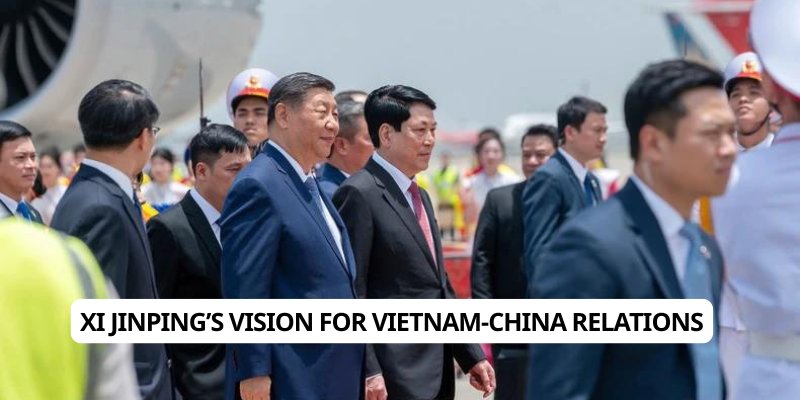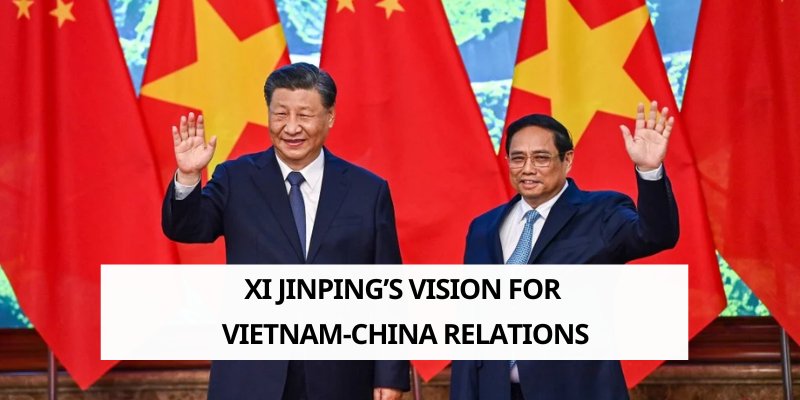China and Vietnam: Xi Jinping’s Call for a Shared Future
On the cusp of his state visit to Hanoi on April 14, 2025, Chinese General Secretary and President Xi Jinping published a stirring message in Vietnam’s Nhan Dan newspaper, calling for both nations to “join hands” in forging a new era of cooperation. Highlighting their shared socialist ideals and mutual interests, Xi’s words set an ambitious tone for a visit that promises to deepen ties through high-level dialogues with Vietnam’s leadership. As the two neighbors navigate a complex global landscape, this moment underscores their potential to shape a prosperous and harmonious future.
Contents
A Bond Forged in Ideology
At the heart of Xi’s message is the profound connection between China and Vietnam, two nations united by their commitment to socialism. This shared ideology, Xi argues, is more than a historical artifact—it is a dynamic force that guides their collaboration in the modern era. As neighbors with intertwined destinies, China and Vietnam have built a relationship grounded in mutual trust and a common vision for progress. Xi’s invocation of this bond resonates deeply, evoking a sense of solidarity in a world often divided by competing interests.

The timing of Xi’s message is significant. Both nations face the dual challenge of sustaining economic growth while addressing global uncertainties, from trade disruptions to technological shifts. By emphasizing their ideological alignment, Xi positions the partnership as a bulwark against external pressures, capable of delivering stability and prosperity. This framing not only reinforces bilateral ties but also elevates the relationship as a model for other socialist states navigating the 21st century.
Confronting Global Economic Challenges
Xi’s message is equally a clarion call for economic resilience. He warns of the perils of trade wars and protectionism, noting that “tariffs have no winners” and “protectionism leads to a dead end.” These words reflect a broader anxiety about the state of global trade, which has been battered by unilateral policies and supply chain fractures. For China and Vietnam—economies reliant on exports and global integration—these challenges are not abstract but existential.
To counter these threats, Xi advocates for strengthened coordination to uphold the multilateral trading system. This includes safeguarding global supply chains and fostering an open international environment. The proposal is strategic: China’s industrial prowess and Vietnam’s manufacturing dynamism make them natural allies in this endeavor. By aligning their policies, they can mitigate the impact of external shocks and champion a rules-based order that benefits developing nations. Xi’s vision is one of shared responsibility, where cooperation trumps isolationism.
A High-Stakes Diplomatic Engagement
The visit itself is a testament to the partnership’s significance. Over two days, Xi will hold talks with Vietnam’s top leaders, including General Secretary To Lam, President Luong Cuong, Prime Minister Pham Minh Chinh, and National Assembly Chairman Tran Thanh Man. These meetings will span a wide range of topics, from economic collaboration to regional security and cultural ties. The breadth of the agenda reflects the complexity of Vietnam-China relations, which encompass both opportunities and challenges.
Economic discussions are expected to focus on deepening trade and investment, with initiatives like the Belt and Road likely to feature prominently. Security issues, including maritime disputes in the South China Sea, will require delicate navigation to ensure stability. Cultural exchanges, a priority for both nations, will further cement people-to-people ties, fostering mutual understanding. Xi’s packed schedule underscores the stakes: this is a moment to set a bold course for the future.

Shaping a New Era
Xi’s closing call to “write a new page” in Vietnam-China relations is both aspirational and pragmatic. It acknowledges the weight of history—marked by moments of tension and reconciliation—while embracing the potential for renewal. The partnership is not without hurdles, from trade imbalances to differing regional priorities. Yet, Xi’s optimism suggests that these challenges can be overcome through dialogue and shared commitment.
The Chinese leader’s emphasis on “inheriting the past” is a nod to the resilience of the relationship. Vietnam and China have navigated complex dynamics to arrive at this point, and their ability to adapt bodes well for the future. By leveraging their complementary strengths, they can build a partnership that drives regional growth and global cooperation.
A Regional and Global Impact
The implications of Xi’s visit extend beyond bilateral ties. In Southeast Asia, where powers like the U.S., Japan, and India vie for influence, the Vietnam-China partnership offers a counterbalance rooted in mutual benefit. By prioritizing collaboration, the two nations can stabilize the region, fostering an environment conducive to development. Their advocacy for multilateralism also challenges the trend toward fragmentation, offering a vision of global unity.
For Vietnam, the visit is a chance to strengthen ties with its largest trading partner while maintaining strategic autonomy. For China, it reinforces its role as a regional anchor, capable of forging alliances based on respect and shared goals. Together, they can shape a regional order that prioritizes prosperity over rivalry.
Xi Jinping’s visit to Vietnam on April 14, 2025, marks a pivotal moment for one of Asia’s most vital partnerships. His message in Nhan Dan lays out a roadmap for deepened cooperation, grounded in shared ideals and a commitment to global stability. As China and Vietnam engage in high-level talks, they have the chance to redefine their relationship for a new era. In a world of uncertainty, their alliance stands as a testament to the power of unity, offering hope for a future where collaboration triumphs over division.